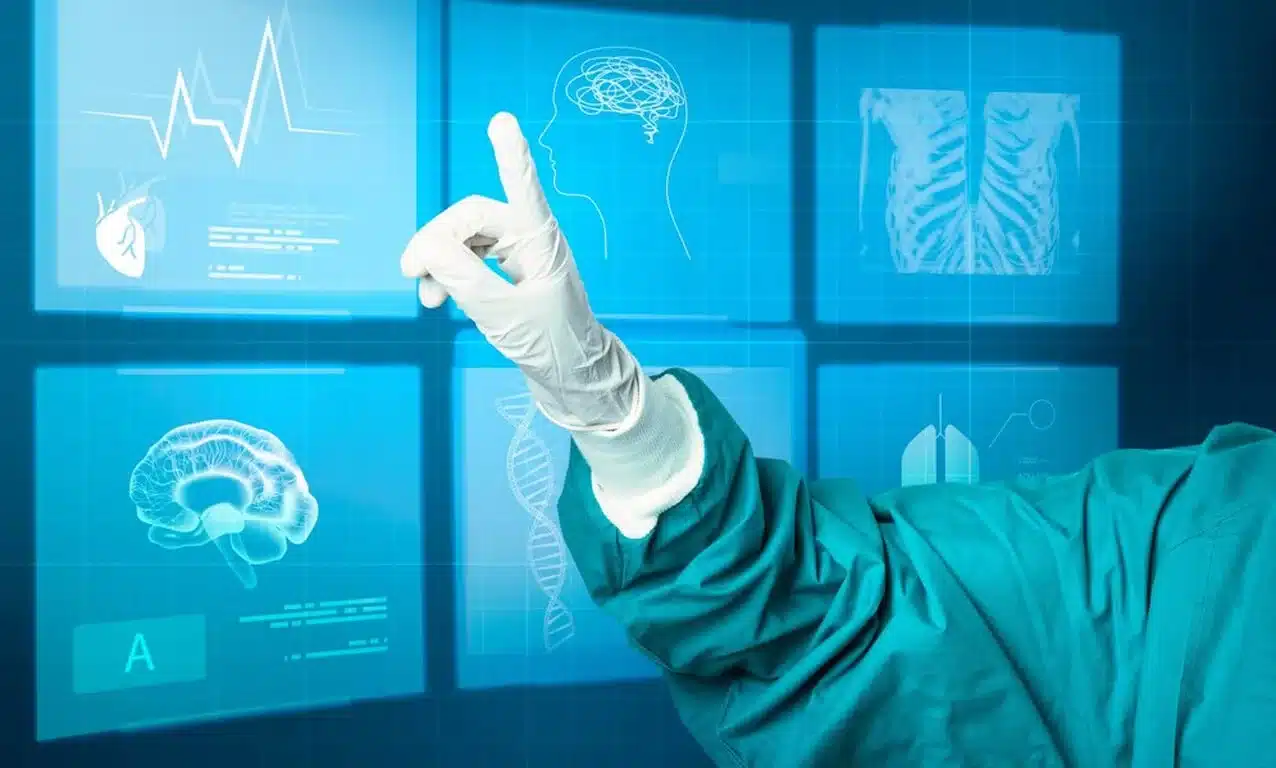Health
Revolutionizing Healthcare: The Emergence of AI-Driven Analytics
Published
7 months agoon
By
Admin
The healthcare sector has always been very important in every age. Well, currently, the healthcare industry is undergoing a great change.
You might be wondering about the reason for the change. Well, it’s none other than the surprise of artificial intelligence (AI). It might sound weird, but AI in healthcare seems to be a new concept that is helping the healthcare sector a lot in changing and making the experience better for patients.
However, this AI further helps healthcare employees in managing medical care and data analysis. Healthcare analytics, a field that uses AI to gain information from health data, is at the center of this technological advancement.
This article analyzes how artificial intelligence (AI)-driven analytics is transforming healthcare and delivering previously uncommon advances in operational effectiveness and patient outcomes.
The Evolution of AI in Healthcare
The journey of AI in healthcare is a tapestry of innovation and breakthroughs. Its roots can be traced back to the early days of computer science, where simple algorithms were used to analyze medical data. Over the decades, these efforts have evolved into sophisticated AI systems capable of performing complex tasks.
Key milestones include the development of AI algorithms for disease prediction, robotic surgeries, and the recent surge in telemedicine, all driven by advancements in machine learning and data processing capabilities.
Applications of AI-Driven Analytics in Healthcare
The impact of AI in healthcare is profound and multifaceted. One of the most significant applications is in predictive analytics. By analyzing patterns in vast datasets, AI can predict disease outbreaks, patient outcomes, and even potential medical emergencies before they occur.
Diagnostic tools, another critical application, have been enhanced by AI to offer faster and more accurate diagnoses, especially in imaging-based fields like radiology and pathology. Personalized treatment plans are now more attainable, with AI algorithms considering individual patient data to tailor treatments.
Additionally, AI’s analytical power is being combined with SPR assays in the field of drug discovery. This combination has the potential to accelerate the development of new medications. AI has also streamlined operational aspects in healthcare facilities, optimizing everything from patient scheduling to resource allocation.
Predictive Analytics
AI is revolutionizing healthcare through predictive analytics, using vast data to forecast health outcomes. By analyzing patterns in historical patient data, AI systems can predict potential future medical events, enabling early intervention and preventive care.
Diagnostic Tools
AI-driven diagnostics are enhancing accuracy and speed in identifying diseases. By processing and interpreting medical images like X-rays and MRIs, AI algorithms are aiding radiologists and physicians in making more accurate diagnoses, often in a fraction of the time.
Personalized Treatment Plans
One of the most exciting applications of AI in healthcare is personalized medicine. AI algorithms analyze a patient’s genetic makeup, lifestyle, and other lots of factors, allowing healthcare providers to tailor treatments specifically to the individual’s needs, thereby increasing their effectiveness and reducing side effects.
Operational Efficiency
AI is also improving operational efficiency in healthcare settings. From optimizing appointment scheduling to managing patient flow and automating administrative tasks, AI streamlines hospital operations, reduces costs, and enhances patient care.
Case Studies and Success Stories
Real-world examples underscore the transformative power of AI in healthcare. For instance, AI-driven analytics have played a crucial role in early detection and treatment of diseases like cancer and diabetes, significantly improving patient survival rates. Another success story is the use of AI in managing patient flows in hospitals, reducing wait times, and improving patient satisfaction.
These case studies not only highlight the practical applications of AI in healthcare but also demonstrate its tangible benefits in improving both patient care and healthcare operations.
Challenges and Ethical Considerations
Despite its benefits, the integration of AI in healthcare is not without challenges. Data privacy and security are paramount concerns, as healthcare data is sensitive and personal. The ethical implications of AI decisions also raise important questions, especially in scenarios where AI systems suggest treatment plans.
Furthermore, there is a need to address the digital divide, ensuring equitable access to AI-driven healthcare solutions across different demographics.
The Future of AI in Healthcare
AI has limitless possibilities in the field of healthcare in the future. Many trendy trends point to a future in which artificial intelligence (AI) will help manage public health on a broader scale, in addition to helping with medical diagnosis and treatment. It is anticipated that advancements in mobile apps with AI capabilities, wearable health technology, and genetics will improve and further personalize patient treatment. Moreover, AI is expected to play a major role in healthcare in the future, providing hitherto unthinkable solutions.
Concluding Thoughts
Hence, we have discussed AI and healthcare in detail. After discussing everything, we can understand that integrating AI in healthcare is not just a technological upgrade but a paradigm shift in how we approach health and medicine. From predictive analytics to personalized treatment plans, AI is unlocking new possibilities and setting the stage for a future where healthcare is more efficient, accurate, and patient-centric.
As we stand on the brink of this AI revolution in healthcare, it’s essential to navigate its challenges thoughtfully, ensuring that the benefits extend to all sections of society. Embracing AI in healthcare is more than an innovation; it’s a commitment to a healthier, more informed, and more inclusive world.

9 Questions to Ask Before Hiring Surveyors in London

Beyond Relaxation: 4 Lesser-Known Benefits Of THC

Boost Your Productivity with the UGREEN Docking Station and USB-C Charger

From Bulbs to Battlefields: The Versatile Applications of Tungsten

Innovative Technologies in Service Doors for Modern Cold Rooms

From Hive to Bowl: Deciphering Honey’s Role in Dog Nutrition

Rustic Retreats: Crafting Cozy Cabins with DIY Metal Building Kits

How to Find the Right Property Valuation Service for Your Needs

The Price of Hasty Weight Loss Is Too Heavy: A Close Analysis

Understanding the Benefits of the IGCSE Curriculum and What Sets It Apart

How Machine Learning and AI are Redefining the Future?

Aliza Barber: Meet Lance Barber’s Wife, Age, Life, Profile, Career and Net Worth

Revolutionizing Healthcare: The Emergence of AI-Driven Analytics

Tex9.net Business: Solve Business Problems with the Help of Tex9.net

Who was Alice Marrow? Everything to Know About Ice-T’s and His Mother

Meet Otelia Cox: The Supportive Wife of Tony Cox – A True Fairy Tale Romance

Exploring Real Estate Market: Smart Strategies for Savvy Investors

How Do Solar Panels Work and Generate Energy for the Grid

Best TikTok Marketing Strategy for Businesses in 2024

Meet Constantine Yankoglu: Patricia Heaton’s Ex-Husband – Everything to Know

9 Questions to Ask Before Hiring Surveyors in London

Beyond Relaxation: 4 Lesser-Known Benefits Of THC

Boost Your Productivity with the UGREEN Docking Station and USB-C Charger

From Bulbs to Battlefields: The Versatile Applications of Tungsten

Innovative Technologies in Service Doors for Modern Cold Rooms

From Hive to Bowl: Deciphering Honey’s Role in Dog Nutrition

Rustic Retreats: Crafting Cozy Cabins with DIY Metal Building Kits

How to Find the Right Property Valuation Service for Your Needs

The Price of Hasty Weight Loss Is Too Heavy: A Close Analysis

Understanding the Benefits of the IGCSE Curriculum and What Sets It Apart
Category
Trending
-

 Technology8 months ago
Technology8 months agoHow Machine Learning and AI are Redefining the Future?
-

 Celebrity3 months ago
Celebrity3 months agoAliza Barber: Meet Lance Barber’s Wife, Age, Life, Profile, Career and Net Worth
-

 Business9 months ago
Business9 months agoTex9.net Business: Solve Business Problems with the Help of Tex9.net
-

 News3 months ago
News3 months agoWho was Alice Marrow? Everything to Know About Ice-T’s and His Mother




